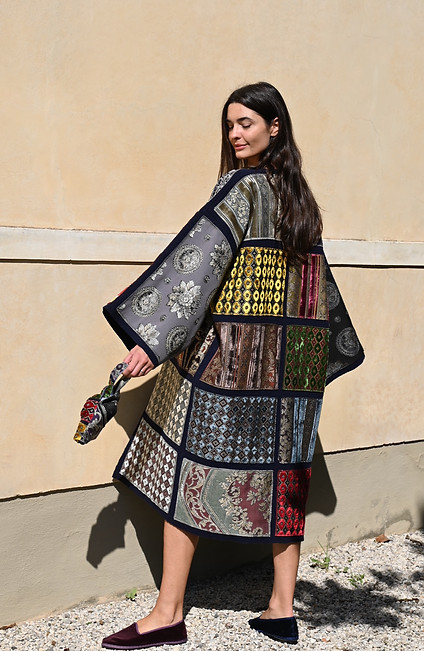MARCO POLO
The Marco Polo Collection evokes the allure of the famous Venetian explorer’s journeys, who brought to the Italian coast Oriental silk and Asian patterns. The set of forms and shapes allows for comfortable yet elegant clothes.
MARCO
Venice being the birthplace of RISA, it was inevitable to work with the symbol of the city: the winged lion. Its unique design in silky and bright tones makes it appear almost three dimensional. Marco Polo left from Venice and travelled throughout the Orient and spread this symbol throughout his trips. Not by chance, it also represents and unites our two collections: MARCO POLO inspired by the East and PALAZZO DUCALE, a palace in Venice’s most famous scare, Piazza San Marco.






XI'AN
This coat is inspired by the terracotta army of Xi’an. It reminisces the soldier’s amors which were composed of small pieces that, like scales, were joined to the body by thin strips. Each RISA creation carries a history that is reinterpreted and moulded by the present times, to elicit confidence in its wearer. This garment could be seen as both an abstract and physical metaphor of this process: it carries a rich background, the dark blue wool and the Chinese army, but it adapts to the present, the vivid bright colors and the wearer’s personality.






KUBLAI KHAN
This garment is inspired by a coat worn by a Chinese emperor, Kublai Khan, under whom Polo served for more than two decades. Our kimonos are garments that carry their own specific history with them, a memory of distant eras, eras in which Marco Polo delved into the deep East and met new cultures, colors and shapes.





SAMARKAND
A luxurious design that evokes distant times of rich and historical décor. The interweaving leaves and geometries symbolize the Venetian culture’s openness to Eastern influences. The copper pattern in the sleeves intensifies at the back, making it the protagonist of the piece: an amaranth silk velvet with embroidery inlayst. The back becomes a fresco: emulating the geometry of Samarkand's beautiful mosques, soft volutes create a sinuous arabesque with a decidedly baroque flavor.
XI'AN





ACRE
Inspired by the painting that depicts the meeting between Federico II, king of Sicily and emperor of the Holy Roman Empire with the sultan al-Kamil in Jaffa in the city of Acre. Following this event, in 1271, Marco Polo sailed from Venice to Acre, and made this city one of his bases for his travels to the East.





LÓNG PÁO
龙袍, pinyin: lóng páo, namely dragon gown, is the Chinese imperial dressing with dragon and auspicious patterns embroideries. The dragon is the highest-ranking animal in the Chinese animal hierarchy: it is held in high esteem for its dignity and power. It is an allegory for protection, good fortune, wisdom, nobility, divinity and power. A triumph of Marco Polo’s discoveries in the East and a festive reuse of a precious ETRO fabric. A jacquard textile that narrates the legend of the dragon, subject of many Chinese legends, but also of Marco Polo’s narrations, which recall his encounter with dragon-like wild animals “huge serpents, ten paces in length, and ten spans in the girt of the body.”







ZHANG QIAN
This garment, with its small squares of pure silk further embellished with delicate silk flowers embroideries, is a tribute to the Silk Road, which was first explored by Chinese official Zhang Qian. A riot of colors and decorations, the floral motifs recall the taste of decorations and famous paintings of peach flowers that, in the oriental tradition, adorned houses. A true masterpiece: a mastery of embroidery, color composition and silk, which also covers the inside of the jacket to create a direct contact with the wearer.




SANDOKAN
In his travels to the East, Marco Polo narrates seeing various wild and exotic animals, which were unkown to the people of the West. Rubelli elegantly reinterprets this theme, creating a fabric that smells of wild jungle, calling it Sandokan. The fictional character of Sandokan reminds us of Marco Polo, a controversial “pirate” who sailed throughout the South China Sea and conquered lands in the East.






QUINSAI
Quinsai was a city that Marco Polo described as "luxurious, elaborate, refined and beautiful". Even though it was located in China, it too was silhouetted by canals, just like Venice, making this an extremely particular location. The design of this wonderful silk, in shades of aquamarine, unites the two cities both visually and symbolically. The swaying reflections creating a common thread between the two civilizations via a two-fold effect: they make us reminisce of the water of the canals but also take us back to the oceans of the” Silk Road" that Marco Polo traveled.





Draped in the soft warm hues of the setting sun over the ancient city of Kashgar, the crisp copper exterior is adorned with intricate arabesque patterns, whilst the interior is soft and warm. The juxtaposition between the jacket’s metallic exterior and its soft interior reflects the city's historical significance as a crossroads of cultures.
KASHGAR







GIARDINO SEGRETO
The Giardino Segreto Skirt encompasses Marco Polo's travels from start to finish. The type of cord adorning the waist reminisces the ties that frame the heavy and sumptuous curtains in the windows of the Venetian Palaces. The red and white stripes, adorned with delicate floral embroidery, echo the vibrant blooms Marco encountered along his expedition, that would then be harvest in secret gardens in the Venetian laguna.





FENICE
This jacket is inspired by the Fenice Theater, as the garment’s arabesque patterns resembles those that adorn the palace’s ceiling. The warm yet elegant soft copper hue that pervades in the main room, is mirrored by the juxtaposition between the jacket’s metallic exterior and its soft interior. It transports the wearer to the theater’s stalls, amongst ladies and knights that attended captivating performances.
